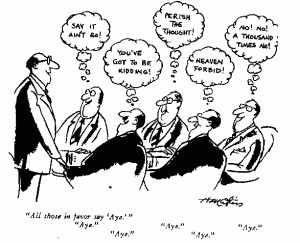Manufacturing Executives: Victims of Groupthink
Felber PR & Marketing, “Adventures in Marketing” –
Over 20 years ago, many manufacturing executives contracted with oversea production believing offshoring was the new trend focusing mainly on the cost of labor. Little did they realize that they settled for the price of poor quality, the loss of intellectual property and the overnight competitors that sprang up as a result, the extension of lead times, the exposure supply of chains to new types of natural disasters and more. Are you a victim of groupthink?
 Chris Chiappinelli – Manufacturing Executive member
Chris Chiappinelli – Manufacturing Executive member
Apple is the latest company to join the U.S. reshoring parade, with CEO Tim Cook announcing that the technology titan will manufacture one of its Mac computers in the country in 2013. It’s another small indication that the reshoring trend—which some people consider a PR ploy born of patriotic fervor and others call an unstoppable force in global manufacturing—has legs.
To understand what is happening today, we need to consider what happened more than 20 years ago, when manufacturing executives, almost en masse in some sectors, closed up shop and contracted with overseas production shops—the dawn of the offshoring boom. There’s a good line in a recent Atlantic article on the manufacturing reshoring trend that sums up why this might not have been the right medicine for manufacturers. Charles Fishman, the article’s author, writes that decades ago:
“Many offshoring decisions were based on a single preoccupation—cheap labor. The labor was so cheap, in fact, that it covered a multitude of sins in other areas. The [recent] approach to bringing jobs back has been much more thoughtful.”
As Fishman notes, manufacturing executives seem to be making more holistic calculations these days—assessing not just the individual components of the cost equation, but the totality of those line items. This interest in a more comprehensive view of manufacturing strategy might explain why a discussion from mid-2011, titled “What Are the Real Costs of Outsourcing,” remains one of the most visited pieces of content on the Manufacturing Executive website.
But what does this say about manufacturing executives? Were the corporate leaders of the 1990s prone to tunnel vision—focusing obsessively on the cost of labor—that today’s leaders aren’t? Not necessarily. But I do think that manufacturing executives, like the rest of us, can be susceptible to groupthink. Think about it: At the pinnacle of the corporate pyramid, the fear of a strategic misstep can be overwhelming. At public companies, activist investors and corporate boards are primed to depose wayward executives. At smaller companies, there’s little margin for misdirection when competitors are clambering to steal your lunch.
In the 1990s, executives who watched their competitors move production to China and other offshore locales felt compelled to chase the trend, lest they lose competitive advantage. And yet even then, with the price of contract labor so low, the holistic cost equation may have favored domestic manufacturing, had U.S. executives truly accounted for a myriad of other items: the price of poor quality, the loss of intellectual property and the overnight competitors that sprang up as a result, the extension of lead times as products steamed slowly across the ocean, the price to send personnel around the globe to manage far-flung operations, the exposure of supply chains to new types of natural disasters, and the loss of a beneficial exchange of ideas between the production floor and the design department.
At the time, some executives must have understood that those “other” elements would wipe out any cost savings on labor. But few had the courage to buck the trend and make their own destiny.
These days, we hear a similar charge of weakness leveled at our elected leaders, as the country faces ominous signs of a troubled future. But I believe the lack of courage we see in some lawmakers stems primarily from their self-interest—many are more interested in positioning themselves for reelection than in making tough decisions. I think manufacturing executives, by contrast, are desperately concerned with the future of their businesses, and fearful of making choices that contravene conventional wisdom, fearful of repercussions.
There’s no inoculation against group think. But choosing to perform a holistic evaluation of the business wisdom du jour is one way to reduce the symptoms. Exhibiting the courage necessary to chart an alternate course might just put this disease into remission.
—
‘Manufacturing Executives: Victims of Group Think‘ was originally posted in the Manufacturing Executive community page.

Leave a Reply
Want to join the discussion?Feel free to contribute!